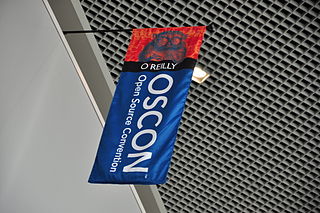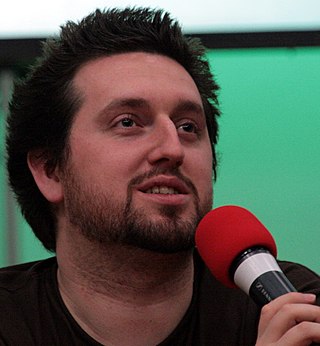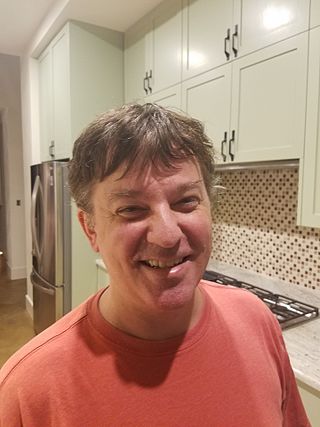The Open Source Developers' Conference (OSDC) was a non-profit conference for developers of open-source software. It was started in Australia in 2004, and later expanded to Israel, Taiwan, Malaysia, France and Norway, where conferences began in 2006, 2007, 2009, 2009 and 2015, respectively. No further conferences have been held since 2015.
The conference was open to talks about software developed for any platform or operating system so long as the talk was of interest to open-source developers. Talks about closed source projects which used open-source languages or open-source projects which used close source languages were accepted. Talks have covered languages such as Perl, Python, PHP, Ruby, Groovy, Scala, Java, Mono and C. Other talks have covered open-source tools such as databases and revision control systems or meta-topics such as talk presentation hints, and working with others.
The conference was founded by Scott Penrose and first organised by members of the Melbourne Perl Mongers group in Melbourne, Australia in 2004. Originally it had been intended to be a YAPC-style (Perl) conference, but after discussions with the Melbourne PHP Users Group it was expanded to include PHP and Python talks. Following the 2004 conference's success, Scott Penrose created the Open Source Developers' Club Association to encourage programmers of other languages to also be involved in running the conference. At first this was an entirely Melbourne based organisation, but after the 2005 conference, it expanded to include members from elsewhere in Australia. At the end of 2006, control of running the conference for 2007 was given to a group in Brisbane, with the Open Source Developers' Club Association committee members taking the role of overseers.
In 2013 the Open Source Developers' Club Association awarded the running of the event to a team in Auckland New Zealand, further expanding the conference with an Australasian focus.
| Conference site | Dates | City | Venue |
|---|---|---|---|
| OSDC2015 Australia | 27–29 October 2015 | Hobart, Australia | Wrest Point |
| OSDC2014 Australia | 4–7 November 2014 | Gold Coast, Australia | Griffith University |
| OSDC2013 NZ | 21–21 October 2013 | Auckland, New Zealand | Langham Hotel, Auckland |
| OSDC2012 Australia | 4–7 December 2012 | Sydney | University of Technology Sydney |
| OSDC2011 Australia | 14–18 November 2011 | Canberra, Australia | Australian National University |
| OSDC2010 Australia | 24–26 November 2010 | Melbourne, Australia | Abbotsford Convent |
| OSDC2009 Australia | 25–27 November 2009 | Brisbane, Australia | Bardon Conference Center |
| OSDC2008 Australia | 2–5 December 2008 | Sydney | Sydney Masonic Centre |
| OSDC2007 Australia | 26–29 November 2007 | Brisbane, Australia | Royal on the Park Hotel |
| OSDC2006 Australia | 5–8 December 2006 | Melbourne, Australia | Monash University Caulfield campus |
| OSDC2005 Australia | 5–7 December 2005 | Melbourne, Australia | Monash University Caulfield campus |
| OSDC2004 Australia | 1–3 December 2004 | Melbourne, Australia | Monash University Caulfield campus |
| Year | Presenter | Paper title |
|---|---|---|
| 2006 | Scott Rippon | Usability, user-centered design (UCD) and FOSS |
| Conference site | Dates | City | Venue |
|---|---|---|---|
| OSDC2006 Israel | 26–28 February 2006 | Netanya, Israel | Netanya Academic College |
| Conference site | Dates | City | Venue |
|---|---|---|---|
| OSDC.tw 2014 | 11–12 April 2014 | Taipei, Taiwan | Building for Humanities and Social Sciences, Academia Sinica, Nangang District |
| OSDC.tw 2013 | 19–20 April 2013 | Taipei, Taiwan | Building for Humanities and Social Sciences, Academia Sinica, Nangang District |
| OSDC.tw 2012 | 14–15 April 2012 | Taipei, Taiwan | Building for Humanities and Social Sciences, Academia Sinica, Nangang District |
| OSDC.tw 2011 | 26–27 March 2011 | Taipei, Taiwan | Building for Humanities and Social Sciences, Academia Sinica, Nangang District |
| OSDC.tw 2010 | 24–25 April 2010 | Taipei, Taiwan | Building for Humanities and Social Sciences, Academia Sinica, Nangang District |
| OSDC.tw 2009 | 18–19 April 2009 | Taipei, Taiwan | Microsoft Taiwan Corporation, Xinyi District |
| OSDC.tw 2008 | 12–13 April 2008 | Taipei, Taiwan | School Of Continuing Education Chinese Culture University, Zhongzheng District |
| OSDC.tw 2007 | 14–15 April 2007 | Taipei, Taiwan | School Of Continuing Education Chinese Culture University, Zhongzheng District |
| OSDC Taiwan 2006 | 8–9 April 2006 | Taipei, Taiwan | School Of Continuing Education Chinese Culture University, Zhongzheng District |
| Conference site | Dates | City | Venue |
|---|---|---|---|
| OSDC.my 2014 | 27 May 2014 | Kuala Lumpur, Malaysia | Berjaya Time Square, Kuala Lumpur |
| OSDC.my 2010 | 29 Jun – 1 July 2010 | Kuala Lumpur, Malaysia | Berjaya Time Square, Kuala Lumpur |
| OSDC.my 2009 | 31 May – 3 June 2009 | Kuala Lumpur, Malaysia | Berjaya Time Square, Kuala Lumpur |
| Conference site | Dates | City | Venue |
|---|---|---|---|
| OSDC.fr 2013 | 4–5 October 2013 | Paris, France | Montrouge Beffroi |
| OSDC.fr 2012 | 12–13 October 2012 | Paris, France | Eurosites George V |
| OSDC.fr 2011 | 23–24 September 2011 | Paris, France | Eurosites George V |
| OSDC.fr 2010 | 9–10 October 2010 | Paris, France | Carrefour Numérique, Cité des Sciences et de l'Industrie |
| OSDC.fr 2009 | 2–3 October 2009 | Paris, France | Carrefour Numérique, Cité des Sciences et de l'Industrie |
| Conference site | Dates | City | Venue |
|---|---|---|---|
| OSDC.no | 8–10 May 2015 | Oslo, Norway | University of Oslo |

In software development, obfuscation is the act of creating source or machine code that is difficult for humans or computers to understand. Like obfuscation in natural language, it may use needlessly roundabout expressions to compose statements. Programmers may deliberately obfuscate code to conceal its purpose or its logic or implicit values embedded in it, primarily, in order to prevent tampering, deter reverse engineering, or even to create a puzzle or recreational challenge for someone reading the source code. This can be done manually or by using an automated tool, the latter being the preferred technique in industry.

Linux Australia is the national, Australian Free and Open Source Software Community organisation. It was founded in 1997 and formally incorporated in New South Wales as a non-profit organisation in 1999. Linux Australia aims to represent Australian Free and Open Source Software communities and to support and collaborate with related groups, including Linux User Groups in Australia.
The Open Bioinformatics Foundation is a non-profit, volunteer-run organization focused on supporting open source programming in bioinformatics. The mission of the foundation is to support the development of open source toolkits for bioinformatics, organise developer-centric hackathon events and generally assist in the development and promotion of open source software development in the life sciences. The foundation also organises and runs the annual Bioinformatics Open Source Conference, a satellite meeting of the Intelligent Systems for Molecular Biology conference. The foundation participates in the Google Summer of Code, acting as an umbrella organisation for individual bioinformatics-related projects.
Ming is a C library for creating Adobe Flash (.swf) files. It is often packaged as a PHP module that allows for the dynamic generation of Flash animations. In addition to PHP, the library can also be used in the programming languages C++, Perl, Python, and Ruby.

Free and Open source Software Developers' European Meeting (FOSDEM) is a non-commercial, volunteer-organized European event centered on free and open-source software development. It is aimed at developers and anyone interested in the free and open-source software movement. It aims to enable developers to meet and to promote the awareness and use of free and open-source software.

linux.conf.au is Australasia's regional Linux and Open Source conference. It is a roaming conference, held in a different Australian or New Zealand city every year, coordinated by Linux Australia and organised by local volunteers.

The O'Reilly Open Source Convention (OSCON) was an American annual convention for the discussion of free and open-source software. It was organized by publisher O'Reilly Media and was held each summer, mostly in Portland, Oregon, from 1999 to 2019.
In computing, a solution stack or software stack is a set of software subsystems or components needed to create a complete platform such that no additional software is needed to support applications. Applications are said to "run on" or "run on top of" the resulting platform.

LAMP is an acronym denoting one of the most common software stacks for many of the web's most popular applications. However, LAMP now refers to a generic software stack model and its components are largely interchangeable.

Jeff Waugh is an Australian free software and open source software engineer. He is known for his past prominence in the GNOME and Ubuntu projects and communities.

Pia Andrews, born 1979, is an open government leader and the Special Advisor, Digital & Client Data Workstream Lead for Employment and Social Development Canada (ESDC).

Allison Randal is a software developer and author. She was the chief architect of the Parrot virtual machine, a member of the board of directors for The Perl Foundation, a director of the Python Software Foundation from 2010 to 2012, and the chairman of the Parrot Foundation. She is also the lead developer of Punie, the port of Perl 1 to Parrot. She is co-author of Perl 6 and Parrot Essentials and the Synopses of Perl 6. She was employed by O'Reilly Media. From August 2010 till February 2012, Randal was the Technical Architect of Ubuntu at Canonical.

Tk is a free and open-source, cross-platform widget toolkit that provides a library of basic elements of GUI widgets for building a graphical user interface (GUI) in many programming languages.

Greg Stein, living in Austin, Texas, United States, is a programmer, speaker, sometime standards architect, and open-source software advocate, appearing frequently at conferences and in interviews on the topic of open-source software development and use.
libxslt is the XSLT C library developed for the GNOME project. It provides an implementation of XSLT 1.0, plus most of the EXSLT set of processor-portable extensions functions and some of Saxon's evaluate and expressions extensions. libxslt is based on libxml2, which it uses for XML parsing, tree manipulation and XPath support. It is free software released under the MIT License and can be reused in commercial applications.
The following outline is provided as an overview of and topical guide to the Perl programming language: